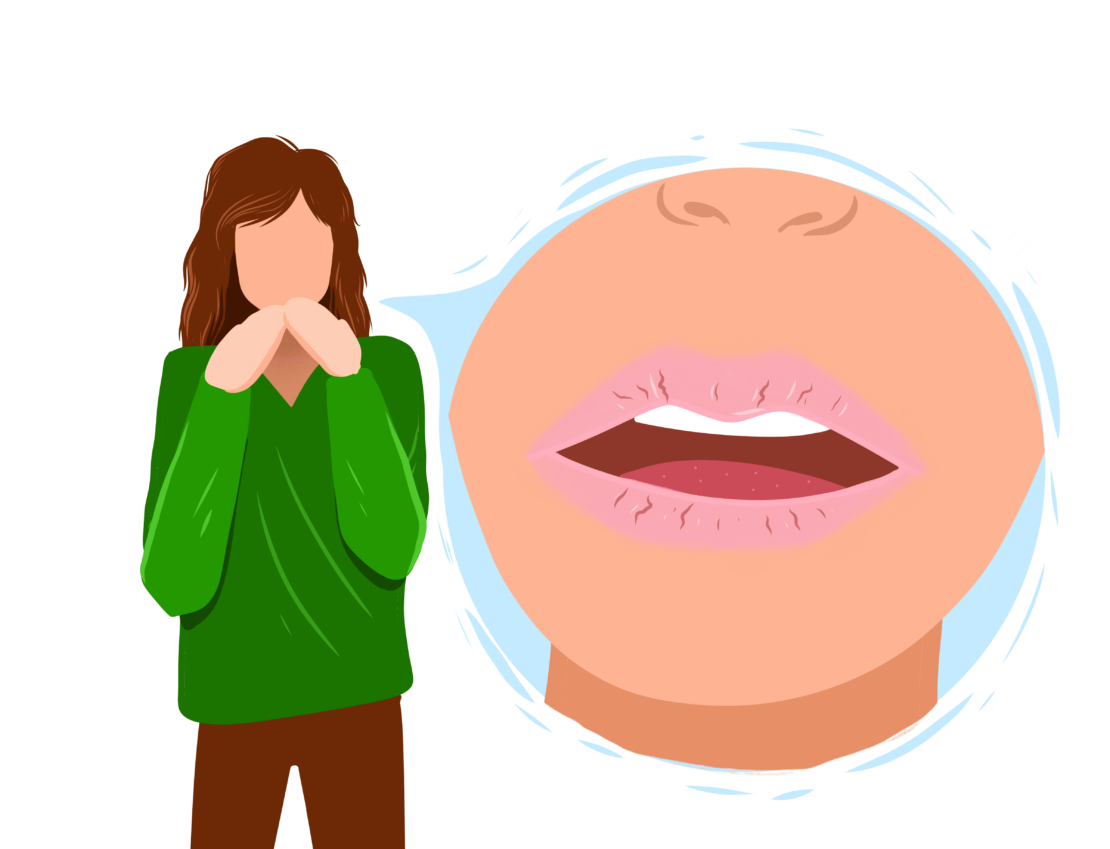Dry mouth, also known as xerostomia, is a common symptom that is experienced when you’re going through menopause. This symptom occurs when the salivary glands in your mouth don’t produce enough saliva; this can cause a dry, sticky feeling in your mouth and throat.
Although it is typically an ageing-related condition, decline in oestrogen levels or hormonal changes in women have a significant role in amplifying the prevalence of these symptoms.
Fortunately, several treatments, ranging from hormone replacement therapy (HRT) to lifestyle adjustments are available to manage dry mouth effectively. In this article, we’ll explore the causes, symptoms, and treatments for menopausal dry mouth to provide a comprehensive understanding of this often overlooked menopausal symptom.
What is Menopausal Dry-Mouth?
Having treated patients at the Online Menopause Centre for over the past two years and (peri)menopausal women in the past decade, we’ve often seen dry mouth be described as a cottony or parched feeling; however it is a surprisingly common yet under-discussed symptom among menopausal women. This symptom is frequently characterised by sticky saliva, chapped lips, and taste irregularities.
Having a dry mouth isn’t just uncomfortable – it can also lead to other issues. It can make it difficult to taste, chew, or swallow, and it might even change the way you speak. You might find that you have a sore throat more often or that your lips are cracked. Also, less saliva can make your teeth more vulnerable to cavities.
Next, we’ll be discussing what causes this drop in saliva production during menopause, and how you can manage it effectively.

What’s Causing Dry Mouth During Menopause

Dry mouth during menopause is caused by a decrease in salivary estradiol, which is associated with the decline in oestrogen levels.
In simple terms, salivary estradiol is like a delivery van that carries oestrogen, a vital hormone in your body. Now, when you hit menopause, the number of these ‘delivery vans’ begins to dwindle. As a result, there’s less oestrogen making its rounds, leading to the many symptoms we often link with menopause.
Here’s where dry mouth comes in. As these oestrogen levels drop, it kicks off an increase in a condition called xerostomia, a clinical name for dry mouth.
This understanding is grounded in a study organised by Tehran University of Medical Science discovered that stimulated salivary estradiol levels were low in postmenopausal women, and observed a direct correlation between declining salivary estradiol levels and an increase in dry mouth symptoms.
Hence, the hormonal shifts taking place during menopause, specifically the decline in oestrogen, are closely tied to the onset of dry mouth.
In the next section, we’ll explore the various treatments that can help manage this uncomfortable symptom.
Treatments for Menopausal Dry Mouth
Navigating through menopause can sometimes feel like walking a winding path, especially when it comes to the symptoms of dry mouth. But don’t worry; there are some practical strategies and treatments that can help ease this discomfort.
Here are some possible treatment options for managing menopausal dry mouth:
Clinically Approved Treatments
Hormone Replacement Therapy (HRT):
This is a common and effective approach to treat symptoms associated with menopause, including dry mouth.
It works by replacing the hormones that the body stops producing after menopause, including oestrogen which influences saliva production. Using HRT could help alleviate dry mouth symptoms by maintaining your body’s natural hormonal balance.
To explore whether HRT is the right solution for you, feel free to book a consultation with us at the Online Menopause Centre. Our team of doctors and nurses are here to guide you through your options and next steps.
Black Cohosh:
This might sound exotic, but it’s a natural product that’s been gaining popularity for its oestrogen-like effects. Black cohosh can help relieve menopause symptoms, and it’s known for causing only mild side effects. It’s best to get advice from an experienced healthcare provider regarding herbal remedies too as these can also stimulate oestrogen receptors.

Natural Treatments
Staying Hydrated:
During menopause, maintaining optimal hydration becomes even more important. Regular water intake can help keep your mouth moist and counter the dryness. Having a water bottle at hand can be a simple reminder to drink water regularly.
Alcohol and Caffeine Cessation:
Alcohol and caffeine can exacerbate dry mouth, as they promote fluid loss. Try reducing your intake and opt for herbal teas or other hydrating, caffeine-free drinks instead.
Nutritious Diet:
Include foods rich in vitamins, minerals, and omega-3 fatty acids in your diet. They support overall health, including that of your salivary glands, and may help relieve dry mouth symptoms.
Regular Exercise/Meditation:
Physical activity improves circulation and contributes to maintaining the healthy functioning of your salivary glands. Incorporate regular workouts in your routine to help manage menopause symptoms. Techniques like yoga, meditation, or deep-breathing exercises can help control stress levels, which can aggravate menopausal symptoms, including dry mouth.
Oral Care Products:
Consider using over-the-counter products designed to moisturise your mouth. These can include alcohol-free mouthwashes, moisturising gels, or sprays designed specifically for dry mouth.
Regular Dental Visits:
Regular check-ups and cleanings can help prevent oral health issues linked to dry mouth, such as gum disease or tooth decay.
Does Dry Mouth Occur in the Early Stage of Menopause?

Yes, dry mouth occurs in the early phases, but it becomes more obvious as women approach postmenopausal stage. Dry mouth affects men as well, but the hormonal changes in women cause the alterations to be more rapid.
A comprehensive study of healthy females undertaken by Ragas Dental College and Hospital in India revealed that symptoms of oral discomfort such as dry mouth are connected with menopause. In comparison to women in the perimenopausal stage, the likelihood that a woman would experience dry mouth is much higher in postmenopausal women.
This is also confirmed in a study conducted by M. Agha-Hosseini et al. at Tehran University of Medical Sciences.
They found that while premenopausal women displayed mild levels of dry mouth, this condition was more pronounced in postmenopausal women. The study indicated that as the salivary estradiol levels decrease (a common occurrence in postmenopausal women), the severity of dry mouth increased.
Proportion of Women Experiencing Menopausal Dry Mouth
It is estimated that 1 in 2 women experience dry mouth as a result of menopause.
This is discussed in a study led by A. Agha-Hosseini et al., from the Faculty of Dentistry at Tehran University of Medical Sciences. According to the results, 50% of the women in menopause experienced dry mouth, a significantly higher percentage compared to the 32% prevalence in men in the same age range.
Additionally, they found that these women also faced challenges such as difficulty eating dry foods and a burning sensation in the oral mucosa. It’s evident that dry mouth is a significant concern for a substantial portion of women as a result of menopause.
As always, these experiences can vary between individuals, reinforcing the importance of professional advice for symptom management.
Other Mouth Problems Related to Menopause
Menopause can bring about a range of oral health challenges in addition to dry mouth.
It can also be associated with various oral health problems such as periodontal disease, tooth loss, and oral mucosal lesions.
According to research published in the J Int Soc Prev Community Dent, menopausal women are more prone to oral discomfort.
They may experience a burning sensation in the mouth, changes in taste perception, and increased susceptibility to oral diseases due to changes in salivary flow and composition.
Further, these women may face a higher risk of periodontal disease and osteoporosis, which can affect the jawbone and lead to tooth loss. This highlights the importance of good oral health practices and regular dental check-ups during and after menopause.

Seek Professional Advice

Experiencing dry mouth during menopause is not uncommon and can be managed effectively. However, if symptoms persist or impact your daily life, it’s crucial to seek professional advice.
At the Online Menopause Centre (OMC), we’re committed to guiding you through this journey. Our expert team of doctors and nurses are well-versed in managing all menopausal symptoms, including dry mouth. We provide individualised treatment plans tailored to your needs and lifestyle.
So, don’t let menopause-related dry mouth keep you from smiling. Reach out to us at OMC today, and let us help you rediscover comfort and confidence in your daily life.
